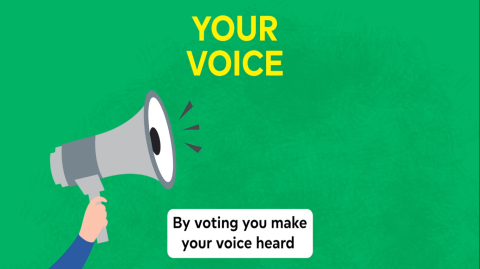Engaging with young people ahead of the European elections

The seventh KCI Virtual Café brought the EU institutions closer to young students of interpretation and translation with multilingual discussions on the upcoming elections and how the EU supports and empowers young people.
On Monday 13 May, a special edition of our KCI Virtual Café series centred on the upcoming European elections. Co-organised with Directorate-General for Translation, the event was dedicated to educating and empowering young Europeans about their voting rights, the EU's impact on youth, and how to effectively communicate ahead of the elections.
Opened by SCIC’s Director-General Ms Genoveva Ruiz Calavera, the event featured multilingual presentations from the Commission’s Directorates-General for Communication (COMM), Education, Youth, Sport and Culture (EAC) and Translation (DGT), and from the European Parliament in French, German, English, Swedish, Romanian and Spanish with simultaneous interpretation into French, German and English being provided by SCIC interpreters.
Several dozen master’s students in interpretation and Commission’s Blue Book trainees joined on-site, with numerous additional participants joining via Interactio or viewing the webstream.
A promising poll conducted during the event revealed that 90% of the participants intend to vote, 7% are undecided, and just 3% do not plan to vote.
The event was an opportunity to bring the EU closer to young people, who, together with the panel members, discussed the EU's commitment to supporting youth and fostering a sense of European identity with opportunities like Erasmus+, the European Solidarity Corps, the European Youth Week (Commission), and the European Youth Event (European Parliament). Additionally, the DiscoverEU programme was highlighted as an example of how young people's ideas can lead to tangible EU initiatives.
Participants also explored the sense of community and active involvement that unites young Europeans, discussing how the European Year of Youth in 2022 was a significant initiative that prioritised youth engagement after the pandemic, offering young people a platform to voice their ideas and contribute to the future of Europe.
Importantly, the event addressed how to engage those unfamiliar with the EU or sceptical about its role using tools like the ‘What Europe Does for Me’ platform to make EU actions more relatable and highlight projects at the local level.
Towards the end of the event, one of the participants expressed appreciation, stating, ‘Thank you for organising this event, for stressing the EU elections campaign and that freedom and democracy are not a given.’
The recording of the event can be viewed following this link.
As the European elections draw near, we can all play a part in fostering European democracy by encouraging people to vote and explaining why it is important. As one panel member noted, ‘It’s not about liking Europe or not liking Europe, or being convinced that everything the EU decides is right; it’s about what we want the Europe of tomorrow to look like, and who could represent our ideas and opinions the best.
